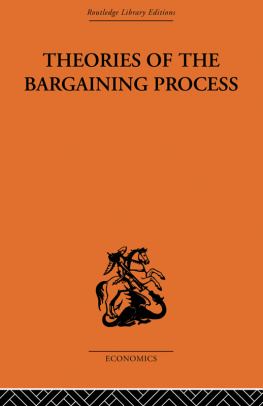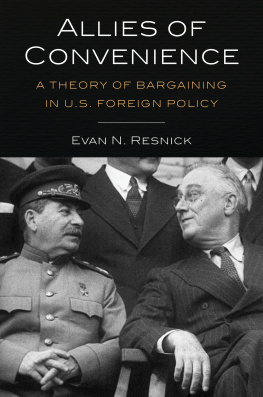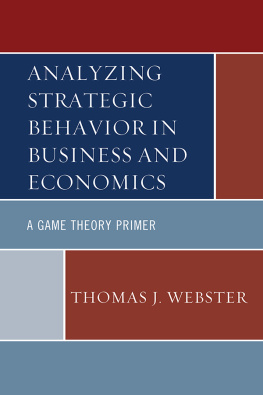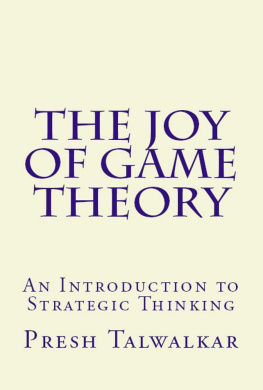Routledge Library Editions
THEORIES OF THE BARGAINING PROCESS

Routledge Library Editions Economics
KEYNESIAN & POST-KEYNESIAN ECONOMICS
In 11 Volumes
I | Keynesian Economics | Coddington |
II | Theories of the Bargaining Process | Coddington |
III | The Social Science Imperialists | Harcourt |
IV | On Political Economists and Modern Political Economy | Sardoni |
V | Essays in the Theory of Economic Fluctuations |
Kalecki |
VI | Theory of Economic Dynamics | Kalecki |
VII | Monetary Theory and Public Policy | Kurihara |
VIII | Applied Dynamic Economics | Kurihara |
IX | Post Keynesian Economics | Kurihara |
X | Alternative Systems of Business Organization and of Workers Remuneration | Meade |
XI | Expectation, Enterprise and Profit | Shackle |
THEORIES OF THE BARGAINING PROCESS
ALAN CODDINGTON

First published in 1968
Reprinted in 2003 by
Routledge
2 Park Square, Milton Park, Abingdon, Oxon, OX14 4RN
or
270 Madison Avenue, New York, NY 10016
First issued in paperback 2010
Routledge is an imprint of the Taylor & Francis Group
1968 Routledge
Reprinted with kind permission of the Estate of Alan Coddington
All rights reserved. No part of this book may be reprinted or reproduced or utilized in any form or by any electronic, mechanical, or other means, now known or hereafter invented, including photocopying and recording, or in any information storage or retrieval system, without permission in writing from the publishers.
The publishers have made every effort to contact authors/copyright holders of the works reprinted in Routledge Library Editions Economics. This has not been possible in every case, however, and we would welcome correspondence from those individuals/companies we have been unable to trace.
These reprints are taken from original copies of each book. In many cases the condition of these originals is not perfect. The publisher has gone to great lengths to ensure the quality of these reprints, but wishes to point out that certain characteristics of the original copies will, of necessity, be apparent in reprints thereof.
British Library Cataloguing in Publication Data
A CIP catalogue record for this book is available from the British Library
Theories of the Bargaining Process
ISBN 978-0-415-31369-8 (hbk)
ISBN 978-0-415-60745-2 (pbk)
ISBN 978-0-415-31367-4 (set)
Miniset: Keynesian & Post-Keynesian Economics
Series: Routledge Library Editions Economics
THEORIES OF THE BARGAINING PROCESS
by
Alan Coddington
Queen Mary College, University of London
With a Foreword by Professor G. L. S. Shackle

FIRST PUBLISHED IN 1968
This book is copyright under the Berne Convention. Apart from any fair dealing for the purposes of private study, research, criticism or review, as permitted under the Copyright Act, 1956, no portion may be reproduced by any process without written permission. Inquiries should be made to the publishers.
Routledge 1968
IN ON 13PT TIMES TYPE
AT THE PITMAN PRESS, BATH
Foreword
by Professor G. L. S. Shackle
The behaviour of inanimate objects is not governed by their possession or non-possession of conscious knowledge. It follows that in assimilating the behaviour of a society to that of an inanimate system, economists of the mechanistic school have assumed away the problem of what men can and cannot know and the influence on their conduct of the beliefs and assumptions, right or wrong, realisable or inherently self-defeating, with which they complement their knowledge or by which they develop proxies for the unknowable. When a type of situation or process presents itself, whose essence is the exploitation by one party of the ignorance of another, it is plain that mechanistic models, and even the scheme of equilibrium, designed to make conceivable the possession by every man of all the knowledge which the scheme makes useful to him, cannot dissect the heart of things.
Not ignorance and uncertainty merely, but mistakenness, belief in something which in fact is false, and further, the deliberate cultivation of uncertainty and mistakenness by one party in the mind of the other, are of the essence of bargaining. Orthodox economic analysis proceeds by saying: It would pay this individual best, in such-and-such circumstances, did he but know that those are his circumstances, to do so-and-so, let us assume that he does know and that he will do it. Equilibrium is the means of being able, without impediment of logic, to ascribe to him that complete relevant knowledge of his circumstances, without which he cannot demonstrate to himself that one course out of all possible courses is objectively the best. But when our problem, of its nature and by its essential terms, precludes us from rather general and basic considerations. But Dr Coddington has shown that much more can be attained, at a price.
A need is felt by many analysts to escape from the assumption that an achieved optimum is the only thing we can understand. How in detail, by what precise sequence of steps or flow of transformation, is a new such optimum attained when the governing conditions which shaped an earlier one have been destroyed? Is there necessarily a path which inevitably leads to a new adjustment? What can the effect be, when different parts of the system respond with various lags to disequilibrium pressures? Such questions lead to the search for principles determining the path of movement which a system will follow, to the devising of dynamic models characterised by equations which associate with each other events or situations of distinct dates. However, it seems that the determining of an equilibrium situation or state of affairs calls for far fewer arbitrary assumptions than that of a path of movement. The former essentially requires us to assume that people seek to satisfy tastes which are characterised by diminishing marginal rates of substitution, by means of resources which show diminishing marginal productivities; and that they possess all the knowledge of their own responses and the technological powers of their resources, and of each others tastes, powers and intentions, which bears upon their own problems of choice. These are very general and, except the last, very plausible assumptions. But no comparable appeal to the basic qualities of human nature and the basic geometry, as it were, of technology can be invoked to select one particular path of movement out of an infinity of such paths. If such a model as Dr Coddington has constructed is to be worth while, it must show itself capable of illustrating and exemplifying principles much more general than its particular illustration of them, such as could scarcely otherwise be elicited. This, I think, is the claim that Dr Coddingtons model can make.
Next page








